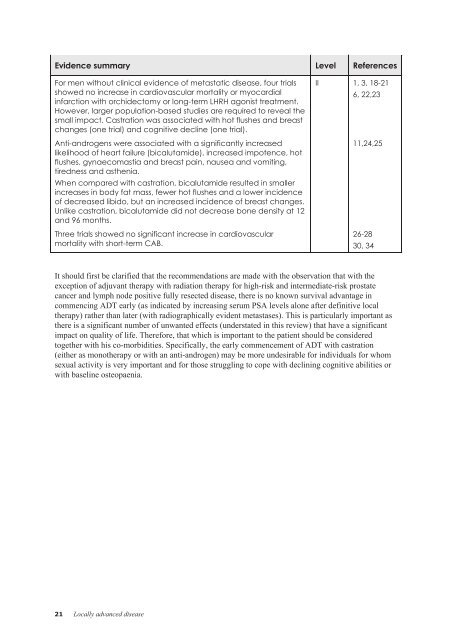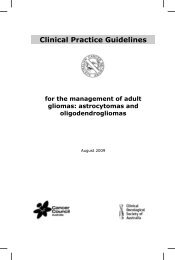Clinical Practice Guidelines for the management of locally advanced ...
Clinical Practice Guidelines for the management of locally advanced ...
Clinical Practice Guidelines for the management of locally advanced ...
Create successful ePaper yourself
Turn your PDF publications into a flip-book with our unique Google optimized e-Paper software.
Evidence summary Level References<br />
For men without clinical evidence <strong>of</strong> metastatic disease, four trials<br />
showed no increase in cardiovascular mortality or myocardial<br />
infarction with orchidectomy or long-term LHRH agonist treatment.<br />
However, larger population-based studies are required to reveal <strong>the</strong><br />
small impact. Castration was associated with hot flushes and breast<br />
changes (one trial) and cognitive decline (one trial).<br />
Anti-androgens were associated with a significantly increased<br />
likelihood <strong>of</strong> heart failure (bicalutamide), increased impotence, hot<br />
flushes, gynaecomastia and breast pain, nausea and vomiting,<br />
tiredness and as<strong>the</strong>nia.<br />
When compared with castration, bicalutamide resulted in smaller<br />
increases in body fat mass, fewer hot flushes and a lower incidence<br />
<strong>of</strong> decreased libido, but an increased incidence <strong>of</strong> breast changes.<br />
Unlike castration, bicalutamide did not decrease bone density at 12<br />
and 96 months.<br />
Three trials showed no significant increase in cardiovascular<br />
mortality with short-term CAB.<br />
II 1, 3, 18-21<br />
6, 22,23<br />
11,24,25<br />
26-28<br />
30, 34<br />
It should first be clarified that <strong>the</strong> recommendations are made with <strong>the</strong> observation that with <strong>the</strong><br />
exception <strong>of</strong> adjuvant <strong>the</strong>rapy with radiation <strong>the</strong>rapy <strong>for</strong> high-risk and intermediate-risk prostate<br />
cancer and lymph node positive fully resected disease, <strong>the</strong>re is no known survival advantage in<br />
commencing ADT early (as indicated by increasing serum PSA levels alone after definitive local<br />
<strong>the</strong>rapy) ra<strong>the</strong>r than later (with radiographically evident metastases). This is particularly important as<br />
<strong>the</strong>re is a significant number <strong>of</strong> unwanted effects (understated in this review) that have a significant<br />
impact on quality <strong>of</strong> life. There<strong>for</strong>e, that which is important to <strong>the</strong> patient should be considered<br />
toge<strong>the</strong>r with his co-morbidities. Specifically, <strong>the</strong> early commencement <strong>of</strong> ADT with castration<br />
(ei<strong>the</strong>r as mono<strong>the</strong>rapy or with an anti-androgen) may be more undesirable <strong>for</strong> individuals <strong>for</strong> whom<br />
sexual activity is very important and <strong>for</strong> those struggling to cope with declining cognitive abilities or<br />
with baseline osteopaenia.<br />
21<br />
Locally <strong>advanced</strong> disease



